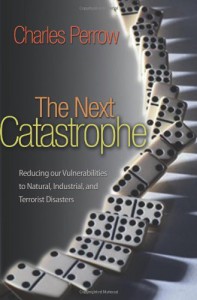 Important contribution, not the whole picture, June 14, 2009
Important contribution, not the whole picture, June 14, 2009
Paul Driessen
I shifted from four to five stars despite the gaps in this book's coverage because on second reading, it does what it set out to do very very well. I will review the other book I bought with this one, The Real Environmental Crisis: Why Poverty, Not Affluence, Is the Environment's Number One Enemy tonight or tomorrow.
What I find especially compelling about this book is that it blows the lid off “non-profits” that are in fact a form of unregulated racketeering, extortion and propaganda (lies). It is completely different from The Skeptical Environmentalist: Measuring the Real State of the World which has its own data quality and analytic integrity issues.
I admire the author's early observation that corporations and non-profits have taken on too many similar characteristics, “to strethc the truth….reinvent relality…substitute hype, spin and clever advertising for honest….and play fast and loose with ethics, the law and the numbers.”
WOW.
The author does a good job of calling into question the applicability and reasonableness of how and when the four pillars of environmentalism are applied:
01) Stakeholder participation (when those representing the poor are not themselves poor and have never talked to a poor person)
02) Sustainable development (as opposed to sustained develop)
03) Preacautionary principle (see my review of Protecting Public Health and the Environment: Implementing The Precautionary Principle
04) Socially Responsible Investing
I am totally impressed by his skewering of specific non-profits (names are named, numbers are provided) that are nothing more than extortion schemes, lacking all academic and scientific credence and relying instead on hit and run lies, orchestrated publicity, etc.
The author impresses with the number of examples and well-cited sources, and two stand out: Greenpeace's lies regarding the Shell oil platform, lies they ultimately apologies for; and Zimbabwe's refusing 26 tons of corn from the USA for the starving poor of Zambia because their dictator was persuaded that the corn was in some manner toxic, genetically modified, and in violation of European trade policies.
I learn the concept of “dead capital” (what our Native Americans would have called a “commonwealth” that could not be deeded), and I see very good discussion of fair trade versus free trade and why wage equivalency may not be the best thing for all concerned.
The author has a fine chapter on the myths of renewable resources but ignored geothermal–the book also ignores nuclear, which may be a non-negotiable intermediate solution for Africa and Central Asia.
The entire discussion of DDT being banned and its consequences in terms of 20 million dead per year from malaria is very worthwhile–I may not buy in to the entire argument, but I certainly respect the author and would want him in the room as a counter-weight to others.
I absolutely love the concluding chapter on investor fraud and the cozy relationships among the non-profit racketeers and the corporations and their CEOs that end up buying into lies for profit and a “bye.”
The bibliography and notes and index are all worth perusing.
I am loading an image of the standard information patholigies that I address (up under the cover of the book being reviewed) and will end with an appreciative note for the importance of truth and morality that the author represents, demanding it from ALL sides. In that he is endorsed by Patrick Moore, a Greenpeace co-founder, who appears mortified at some of the lies and malpractices that Greenpeace today has promulgated or adopted.
Other books I recommend that the author is not really focused on:
The Next Catastrophe: Reducing Our Vulnerabilities to Natural, Industrial, and Terrorist Disasters
Natural Capitalism: Creating the Next Industrial Revolution
The Fortune at the Bottom of the Pyramid: Eradicating Poverty Through Profits (Wharton School Publishing Paperbacks)
The Wealth of Networks: How Social Production Transforms Markets and Freedom
A More Secure World: Our Shared Responsibility–Report of the Secretary-General's High-level Panel on Threats, Challenges and Change
Ecological Economics: Principles And Applications
Collective Intelligence: Creating a Prosperous World at Peace
IO disagree with the author on one point: helping the poor as the expense of the environment is not a given. We spend 2.2 trillion a year on war and violence, when one third of that amount could give every one of the five billion a free cell phone (education one call at a time as advocated by Earth Intelligence Network), shelter, clean water, and a basic diet. (see calculations by Medard Gabel, EO Wilson, and Lester Brown).
This is a fine book, it may be a subsidized book (Heritage Foundation is in the mix) but it passes my smell test. Absolutely a voice to be heard.




